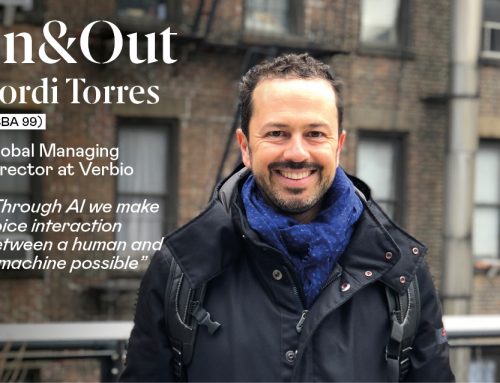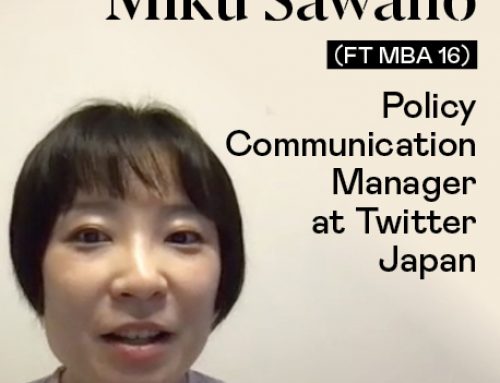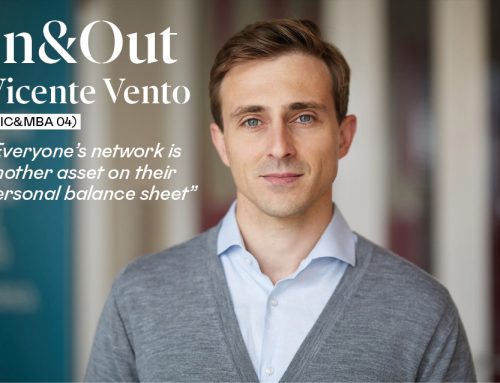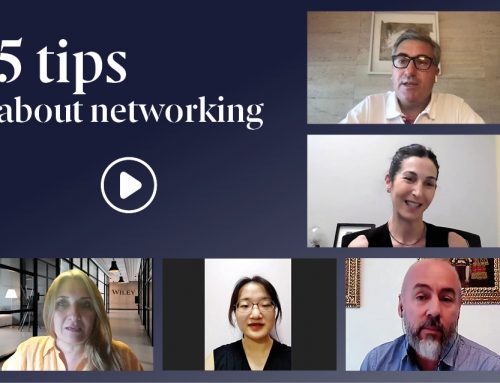Jaime Blanco de Blas (Marketing, Sales and Digital Management ‘17)
Jaime Blanco de Blas (Marketing, Sales and Digital Management ‘17) is the founder of the Nicta Digital Group and chair of the eSports Commission at IAB, the world’s largest communication, advertising and digital marketing association. This working group was created in early 2018 in response to the significant growth of eSports. Its purpose is to promote eSports within the digital industry, publicise its capacities in digital communication, create common standards, raise awareness in the market and earn the confidence of advertisers. The commission features the participation of major players in the industry, from endemic figures to manufacturers, publishers, competition operators, club owners, and specialists from agencies and media outlets. In this interview, Jaime discusses the growth of the sector and the opportunities it has generated.
A growing industry

-What are your functions and objectives within the commission?
My functions are framed within an environment of inclusive and participatory teamwork involving all members of the commission. I am involved in coordinating, generating and promoting new proposals, as well as publicising projects that are carried out together with the management of IAB.
The objective is clear: to develop valuable content and tools that generate confidence among advertisers and other figures in order to develop the eSports industry, with the goal of achieving the greatest possible visibility, use and participation.
The commission’s most recent milestone was the publication of the eSports White Paper, which provides a global vision of the ecosystem, players, audiences, KPIs, measurement and legal issues, as well as case studies, best practices and trends.
– What approach should eSports marketing and communication strategies take?
eSports are electronic sports where people compete via video games. It is important to note that this is one of the most popular digital entertainment options among young audiences. Brands that want to have an impact on this hard-to-reach audience and deliver relevant brand experiences that further their business objectives should consider developing a presence in these communities. Since this is a complex ecosystem and an audience that is highly participative and permeable to brands – but also demanding – it is important to adapt our communication to their environment, habits and expectations. The greater the flexibility and interactivity, the greater the likelihood of success, although we have to stick to our own KPIs, not the standard ones used for digital media or networks.
There is clearly an opportunity, since this environment is constantly growing. It is a receptive audience that is currently under-saturated by brands. eSports are being amplified to more traditional forms of mass media. But before diving in, you have to ask yourself questions such as: What do I want to achieve in this space? What role do I want to play? Which of my brand values do I want to convey?
“Since this is a complex ecosystem and an audience that is highly participative and permeable to brands, it is important to adapt our communication to their environment, habits and expectations”
-In terms of advertising, do you think that YouTubers, streamers, etc., are more influential nowadays than conventional commercial marketing?
The IAB’s recently published 2021 Social Media Study – now in its 12th edition – found that 74% of people between the ages of 16 and 24 (Generation Z) say they do follow influencers. And if we consider the recent mass media successes of content creators such as Ibai and TheGrefg, it is clear that, among certain audiences, influencers have a large impact. But we have to consider that marketing actions with these sorts of profiles are very different from those done by traditional celebrities.
Therefore, I do consider that influencers are more relevant among young audiences and in specific niches, but your starting point should be your business and marketing objectives. You have to seek out the most effective strategies, channels and media to achieve those aims with your target audience
Future prospects
-How has the pandemic affected the world of eSports? Has eSports gained a larger audience at the expense of traditional sports?
In terms of eSports viewership and community participation, 2020 was a turning point, especially the lockdown months, during which eSports were the only active competitions. According to Newzoo, streaming viewing hours grew by 369% in Spain over the course of 2020.
Logically, the hours of digital-only home entertainment dropped as restrictions were relaxed, but the eSports industry was able to close the year with growth and increased exposure. Even the International Olympic Committee recently got on board with the Olympic Virtual Series.
“In terms of eSports viewership and community participation, 2020 was a turning point, especially the lockdown months”
To be sure, traditional sports and eSports are heterogeneous and usually complementary, and viewership of some sports is on the decline in younger segments. According to a study by Sports Business Daily, just 41% of Generation Z follow their favourite sport on TV, which is 34% less than Baby Boomers. But there are international and local leagues and clubs that are working to integrate them. LaLiga, for example, has been making efforts for years in the area of social media and content and promoting its eSports competition, even during lockdown.
-What countries are most involved in this sector and why?
China is the largest market in economic terms – it is expected to close 2021 at a value of $315.1 million – followed by North America and Western Europe. Europe’s third-place showing despite having a smaller population is evidence of its importance as a market. Spain and Portugal were the countries that grew the most in percentage terms in 2020, and Spanish is the second most followed language in eSports after English, according to Newzoo. These figures illustrate the importance of our market as well as its reach, thanks to the clubs and streamers we have here. The importance and market share of each country depends greatly on the games favoured by each audience and the level of professionalism of the clubs.
-What are the socioeconomic expectations for this sector in the coming years?
According to recent data from AEVI, the eSports market in Spain earned €27 million with direct players by the end of 2020, although there was a decline in revenue, probably due to budget freezes and the impossibility of holding physical events during that year, although the audience grew and continues to grow, and the number of workers also increased by 33%. According to data from Newzoo’s eSports report, global turnover is expected to grow by 14.5% to nearly $1.1 billion dollars and is estimated to reach $1.6 billion in 2024. If we continue along the path of double-digit annual growth, the total global audience is estimated to reach 474 million in 2021.
-Could you tell us a bit about the concept of “training” for eSports professionals?
Clubs are replicating the organisation charts and processes of traditional sports clubs. They have sporting directors, coaches, nutritionists, physical trainers and many hours of training, but they adapt to the other needs of their younger players. As it happens, in Spain we have very important clubs with an international reach that are highly professionalised at all levels.
A community with common values
-Tell us about your connection to and involvement with the Esade Alumni community.
Esade’s alumni community has very strong ties, because the school manages to generate a sense of belonging with common values and a vision of business that facilitates understanding. I consider myself to be very active. Esade encourages contact through activities such as continuous training, sector-specific clubs, mentoring and a delightful initiative called Esade Alumni Social, where I currently participate with a team of pro bono consultants working on a social project.
-How has your time at Esade influenced the course of your career?
My experience at Esade has enhanced my strategic business vision and the development of my critical thinking to evaluate strategies, with a clear business orientation and a focus on people. It has been very stimulating to interact with speakers and professional colleagues, who have provided me with the tools to grow and fostered my desire to keep learning and improving as a professional. I also think Esade has been the best influence for my latest career move, which was to create a digitalisation company as a founding partner. At Nicta Digital Group, we offer comprehensive services to help SMEs with their digitalisation process and we have a specific eSports strategic consultancy vertical for marketing departments and agencies.





